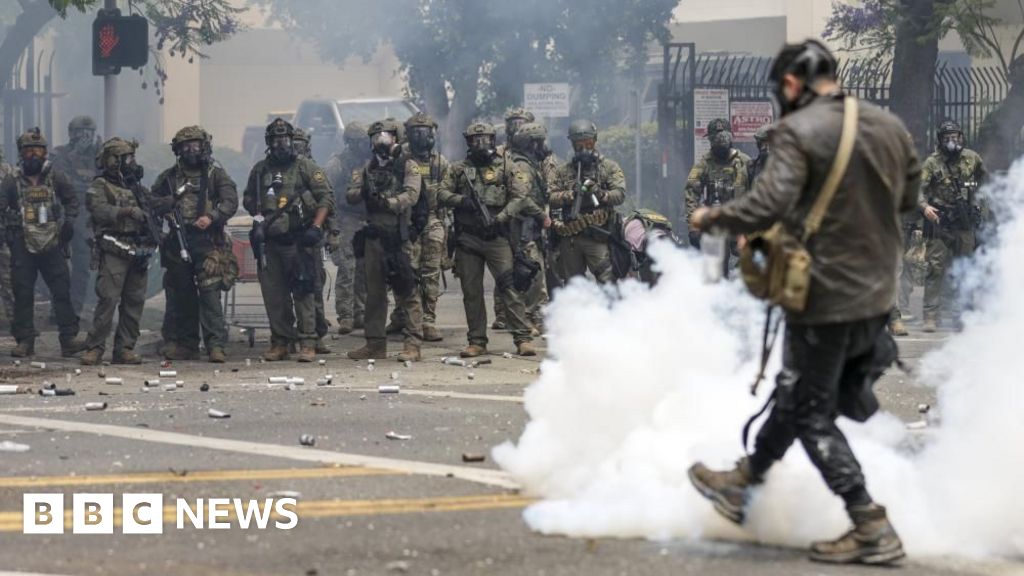ARTICLE AD BOX
By Bernd Debusmann Jr
BBC News
Image source, Getty Images
Image caption, Afghan refugees arriving in the US in AugustWARNING: This story contains graphic descriptions of violence.
Hundreds of Afghans are starting new lives in the US after escaping the Taliban. What advice do other former refugees living in the US have for them about what's ahead?
When Louisiana resident Dauda Sesay was 16 years old, he watched as his father was executed before his eyes.
He was outside playing with friends when rebels attacked and lined the children up to chop off their hands. His father quickly rushed to the scene to save them.
"He knelt down and pleaded on our behalf, to leave the children alone," he told the BBC. "Those were my dad's last words... unfortunately, he was shot while making his case."
Mr Sesay survived. After being shot in the leg and losing consciousness, international forces rescued him and transported him to Gambia, leaving behind a brutal civil war in Sierra Leone that also claimed the life of his younger sister.
Now in his late 30s, Mr Sesay is one of the more than three million refugees and asylum seekers that have found a new home in the US since 1975.
Image source, Courtesy Dauda Sesay
Image caption, Dauda SesayMany - like Mr Sesay - have come to the US after leaving homelands ravaged by war and civil strife, such as Bosnia, the Democratic Republic of the Congo, and Iraq. Still others are fleeing repressive governments, instability, or simply abject poverty. In many cases, it's a combination of these factors.
The number of new refugees in the US is expected to double following the Biden administration's decision to raise the refugee admissions cap to 125,000 for the 2022 fiscal year which began on 1 October. It had already been raised from 15,000 to 62,500 earlier in May.
The newcomers are likely to include thousands of Afghans who didn't meet the minimum requirements of the US Special Immigrant Visa (SIV) programme available for those who helped the US military. The State Department has said that other at-risk Afghans will have "enhanced access" to the US refugee admissions programme.
As these newcomers begin to navigate life in America, refugees already in the US say they can't help but think of their own experiences arriving in the country - the good, the bad and the ugly.
"We look at each other and have one thing in common," said Mr Sesay, who now serves on the board of the advocacy organisation Refugee Congress and is president of the Louisiana Organization for Refugees and Immigrants.
"In one way or another, each of us was forced to flee and look for safety."
A shock to the system
After nine years in a refugee camp in Gambia, Mr Sesay and his wife - a fellow refugee - were resettled in the US by the UN. When they arrived in Louisiana in 2009, Mr Sesay remembers fewer than 10 Sierra Leonean families living there.
"There's that excitement of coming, that you're leaving a refugee camp and travelling to the US," he recalled. "But after a while, you start getting to the reality of the land."
Mr Sesay said that he quickly realised that the US is extremely different culturally from his homeland - a problem that plagues refugees from many parts of the globe.
For example, in Sierra Leone making eye contact with elders when they are talking is a sign of disrespect, "but here, if you don't do that, it looks like you're not honest," he pointed out.
His initial feelings of isolation were made worse when he began university, where he was bullied by a professor who refused to call him by his name. "I was fulfilling the dream of my late father," he said. "Instead I had this obstacle, this professor calling me names. It almost made me drop out of school."
His fellow students eventually intervened.
Image source, Courtesy Lubab Al-Quraishi
Image caption, Lubab Al-QuraishiLubab Al-Quraishi, an Iraqi refugee in New Jersey, recalled a moment of shock when a woman in a Walmart began verbally abusing her for wearing a traditional hijab.
"She was criticising me and shouting. I was so afraid. She told me to go back to my country," said Ms Al Quraish.
She had mixed feelings about America.
On one hand, she was relieved that her family had managed to leave Iraq, where in 2009 she had narrowly escaped an attempt on her life as she drove to work at Baghdad Medical College.
Image source, Getty Images
Image caption, A US troop greets an Afghan child who arrived in the US in August"I don't know why they wanted to kill me. Nobody was immune," she said. "When it became a matter of life or death, it was time to leave. I had kids and a family."
Her newfound safety came at a cost.
In Iraq she lived the life of a professional as a doctor and assistant professor of medicine - complete with a large house and two cars - in the US she was resettled in a blighted section of Houston.
Her education and medical experience meant nothing in her new home. To support herself, she began working a drive-thru counter at a fast-food chicken restaurant, followed by stints at a bakery and as a pharmacy cashier.
"I felt as if I'd been insulted for years," she said. "Nobody would look at me as a physician. Nobody gave me an opportunity."
Over time, Ms Al Quraishi worked her way back into medicine from an entry-level position, first as a pharmacy tech and now as a licensed pathologist assistant.
Even 10 years after arriving and becoming a US citizen, Ms Al Quraishi said she still does not feel at home.
"I don't feel as if I belong. I'm a citizen, but I still feel I'm not welcome," she said. "There are certain places I cannot go because of my hijab. People will give me looks."
'Parents have to understand'
Washington DC-based Jessi Calzado-Esponda recalled, more than anything, a feeling of confusion.
In 1995 - at the age of seven - Ms Calzado-Esponda was rescued at sea in a raft alongside 16 other people who fled Cuba. After seven months at a refugee camp in Guantanamo Bay, she and her grandmother moved to Florida.
"It happens in the blink of an eye," she said of the change from a life surrounded by extended family to a new, unfamiliar one suddenly thrust upon her. "It was a very traumatising experience."
"Nobody ever explained to me why I just spent six days in a raft, then in a refugee camp and a different country," she said.
Data from the UN suggests that as many as a quarter of all refugee children around the world suffer from loneliness and depression, as well as high rates of anxiety and post-traumatic stress. Often, the problems are compounded by bullying and other forms of social exclusion.
George Tarr, who came to the US as a refugee from Liberia at the age of seven, said that he experienced that first-hand when he began school in New York City.
"We faced a lot of discrimination. It was shocking to me because it came from people the same skin colour as us," he said. "There was a lot of bullying… I fought with other kids a lot."
Image source, Courtesy Jessi Calzado-Esponda
Image caption, Jessi Calzado-EspondaYoung refugees face unique challenges and new Afghan arrivals should, as much as possible, help their children by taking advantage of any resources that can be available for youths, said Ms Calzado-Esponda.
"They can get the mental health help their families need," she said. "Those conversations need to happen so that children understand they're in a safer environment."
Making a home
Looking ahead to the expected influx of Afghan and other refugees into American communities following Mr Biden's decision to raise the refugee cap, many past refugees believe their own experiences can serve as lessons for the newcomers.
Ms Al Quraishi, for example, said she would advise incoming refugees - many of whom will be leaving respected professions in Afghanistan - to "work with dignity" no matter what they find themselves doing.
"I'd tell them: work on yourself. Invest any penny that you can bring from your country of origin," she said. "Nobody's going to help you in the US to build your new life."
Others, such as Mr Tarr, say they believe that new refugees should be willing to ask for help, even if that means overcoming cultural differences or a fear of the unknown.
"Try to learn as much as possible. Don't be afraid to ask questions. When we first came here, a lot of strangers helped us," he said. "People here are actually very friendly and very welcoming. Don't be afraid. People are actually more willing to help than you can ever know."
Image source, Courtesy George Tarr
Image caption, George TarrMr Sesay said that he finally felt at home when he began celebrating festive occasions - such as Thanksgiving or Ramadan - with people in his new home.
"All those things bring memories back," he said. "It's just in a different way."
There is little advice that anyone can give to refugees working to overcome lingering trauma in a starkly different country than their own, he said, but strength of will "will go a long way."
But new refugees are not alone. "Others have been in these situations and were able to survive," he said. "This is just the beginning."

 3 years ago
53
3 years ago
53








 English (US) ·
English (US) ·